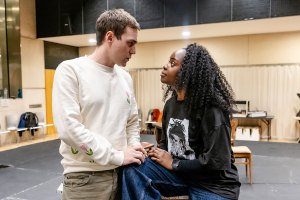The Bengsons’ Ohio at Edinburgh Fringe and on tour – review
Shaun and Abigail Bengson’s show runs at Assembly Roxy until 24 August, before touring to Bristol and London

Originality on the Edinburgh Fringe is hard to find. But a show about death, deafness and God that uses folk songs and a slide projector to make its points scores high on that count. The fact that the result, from the married American Indie-Folk duo, The Bengsons, is also moving, thought-provoking and often very funny makes it a genuine gem, a diamond in the rough of so many shows striving for any one of those qualities.
It has good credentials. It’s already been something of a sensation off-Broadway and it is brought to Edinburgh – and soon to the Old Vic in Bristol and London’s Young Vic – by producer Francesca Moody, who nurtured Fleabag and Baby Reindeer.
Its extraordinary quality lies in an almost magical entwining of music and story, the way the delicate songs – sung beautifully by bouncy optimistic Abigail and played on guitar by wry, pensive Shaun – both contradict and reflect the narrative that unfolds. “This is a death concert,” Abigail cheerfully announces within moments of arriving on stage. “Shaun is going to die at the end and we’re so happy.”
The story has two main strands: the first concerns Shaun’s congenital hearing loss, which means that he increasingly cannot hear the music he is playing. Clever use of microphones and computer graphics – the entire show is captioned – reveals just how much he cannot hear now, and how much he is expected to hear in a few years’ time. He has inherited his deafness from his father, a Lutheran pastor in a particularly muscular Church community in Ohio.
The second theme is the recession of Shaun’s faith, which he loses at around the time his hearing begins to decline, leaving him without the consolation of heaven that has sustained him throughout childhood. In fact, the show opens with his description of a near-death experience in boyhood, when his father’s strong arms saved him from a sinkhole.
Death stalks the show. “We’re doing this to get less afraid of disability, community, and most of all death,” Abigail says, before launching into a story about terrifying their child with her descriptions of what happens after you die. But so does light.
The script is full of vivid descriptions. On a slide projector, we are shown the upright stereocilia, so vital for hearing, falling prone and dying as Shaun’s tinnitus worsens; he talks about a canyon floor full of “ancient sea creatures and Coors light beer cans”; we see a model of the living room where he grew up; we hear the story of a traumatic birth and experience – in a sudden jolt of panic – the fact that he cannot hear when Abigail calls him.
It’s a sophisticated construct, directed with fine control by Caitlin Sullivan, introducing with breezy assurance elements of audience participation both in the songs and in the script – “we’re both disabled, we’ll hold for your applause,” says Abigail, who is autistic.
But the overall impact is warm and rapturous. It has a sense of the numinous even as it describes the slow withdrawing roar of both religion and hearing from Shaun’s life. It feels powered by something a bit bigger than itself. Which is why its impact is so powerful.

















